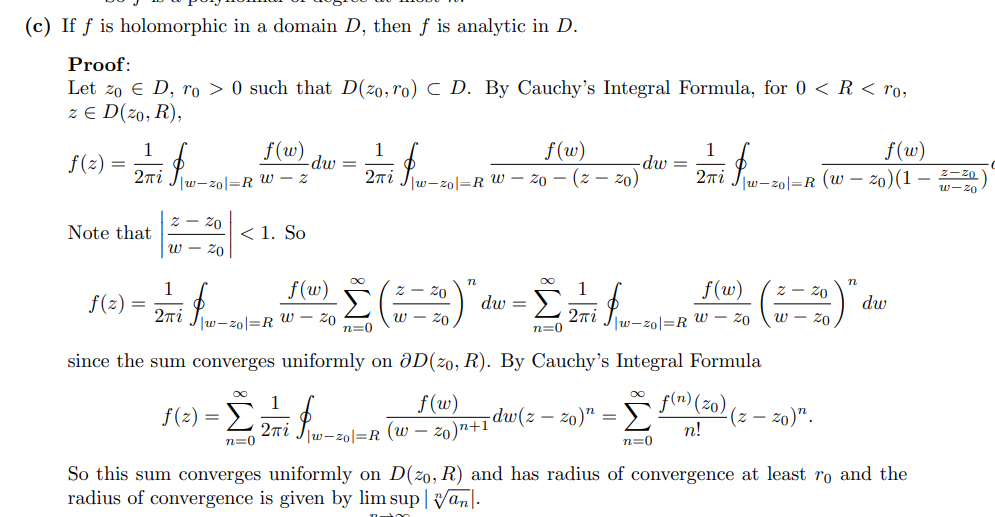A function \(f:\Omega \to {\mathbb{C}}\) is analytic at \(z_0\in \Omega\) iff there exists a power series \(g(z) = \sum a_n (z-z_0)^n\) with radius of convergence \(R>0\) and a neighborhood \(U\ni z_0\) such that \(f(z) = g(z)\) on \(U\).
Any power series is smooth (and thus holomorphic) on its disc of convergence, and its derivatives can be obtained using term-by-term differentiation: \begin{align*} {\frac{\partial }{\partial z}\,} f(z) = {\frac{\partial }{\partial z}\,} \sum_{k\geq 0} c_k (z-z_0)^k = \sum_{k\geq 1} kc_k (z-z_0)^k .\end{align*} Moreover, the coefficients are given by \begin{align*} c_k = {f^{(n)}(z_0) \over n! } .\end{align*}
For any \(p\in U\), \begin{align*} f(p) = {1\over 2\pi i }\int_{{{\partial}}U} {f(z) \over z-p} \,dz .\end{align*}
Differentiating under the integral above yields \begin{align*} c_k = \frac{f^{(k)}(p)}{k !}=\frac{1}{2 \pi i} \int_{\partial U} \frac{f(z) }{(z-p)^{k+1}} \,dz = {1 \over 2\pi R^n}\int_0^{2\pi} f(z_0 + Re^{i\theta})e^{-in\theta} \,d\theta .\end{align*} For \(R \coloneqq d(p, {{\partial}}U)\), this yields a bound \begin{align*} f(z) = \sum c_kz_k \implies {\left\lvert {c_k} \right\rvert} \leq {\sup_{z\in {{\partial}}U}f(z) \cdot \mathop{\mathrm{length}}({{\partial}}U) \over 2\pi R^{k+1}} ,\end{align*} so \(\limsup {\left\lvert {c_k} \right\rvert}^{1\over k} < R^{-1}\), showing that \(\sum c_k (z-p)^k\) has radius of convergence at least \(R\) and is represented by its power series in \(D_R(p)\). This implies that \(f\) is smooth at \(p\in U\), and thus can only have poles on \({{\partial}}U\).
If \(f\) is analytic on \(D_R(p)\), then \(f(z) = \sum c_k(z-p)^k\) on this disc.
Reduce to \(z\in {\mathbb{D}}\), then for a fixed \(z\) and any \(w\in S^1\), \begin{align*} {1\over w-z} = {1\over w} \qty{ 1 + \qty{z\over w} + \qty{z\over w}^2 + \cdots} ,\end{align*} which converges uniformly on \(S^1\). Then \begin{align*} f(z)=\frac{1}{2 \pi i} \int_{S^{1}} \frac{f(w) }{w-z} \,dw = \sum z^{k} \frac{1}{2 \pi i} \int_{S^{1}} \frac{f(w)}{w^{k+1}} \,dw =\sum c_{k} z^{k} .\end{align*}

\(f(z) = e^z\) is uniformly convergent in any disc in \({\mathbb{C}}\).
Apply the estimate \begin{align*} {\left\lvert {e^z} \right\rvert} \leq \sum {{\left\lvert {z} \right\rvert}^n \over n!} = e^{{\left\lvert {z} \right\rvert}} .\end{align*} Now by the \(M{\hbox{-}}\)test, \begin{align*} {\left\lvert {z} \right\rvert} \leq R < \infty \implies {\left\lvert {\sum {z^n \over n!}} \right\rvert} \leq e^R < \infty .\end{align*}
Exercises
Show that if \(f\) is non-constant, then \(f'\) is analytic and the zeros of \(f'\) are isolated. Show that moreover if \(f,g\) are analytic with \(f'=g'\), then \(f-g\) is constant.